Cryptocurrency Information
Xapo: Secure Bitcoin Wallet, Coin Storage Vault & Crypto Card App?
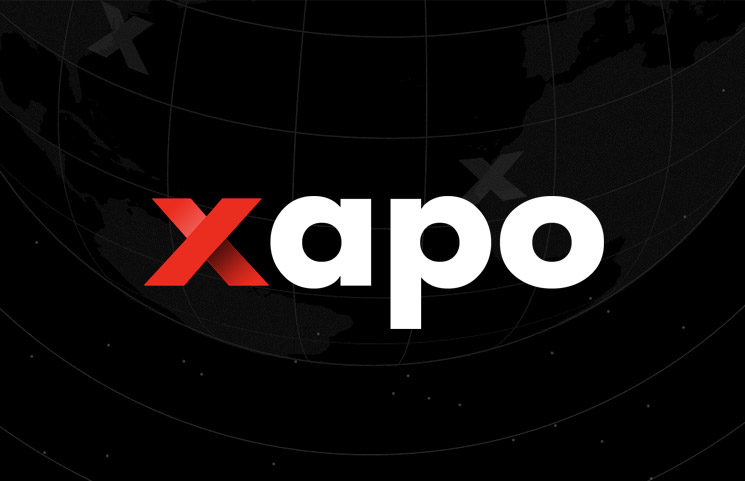
Have you heard of Xapo recently? Founded in 2013, Xapo has developed a massive presence in the cryptocurrency industry by offering Bitcoin wallet services, cold wallet storage, and the ability to quickly and easily purchase Bitcoin. Subsequent to the dramatic mainstream entrance of cryptocurrency into the mainstream zeitgeist at the end of 2017, millions of individuals around the world are seeking accessible, uncomplicated methods of accessing, storing, and purchasing crypto investments — a market segment that Xapo has set firmly in their sights.
If you are a newcomer to the world of crypto or a seasoned trader looking for a new exchange, welcome to our review of Xapo.
What is Xapo?
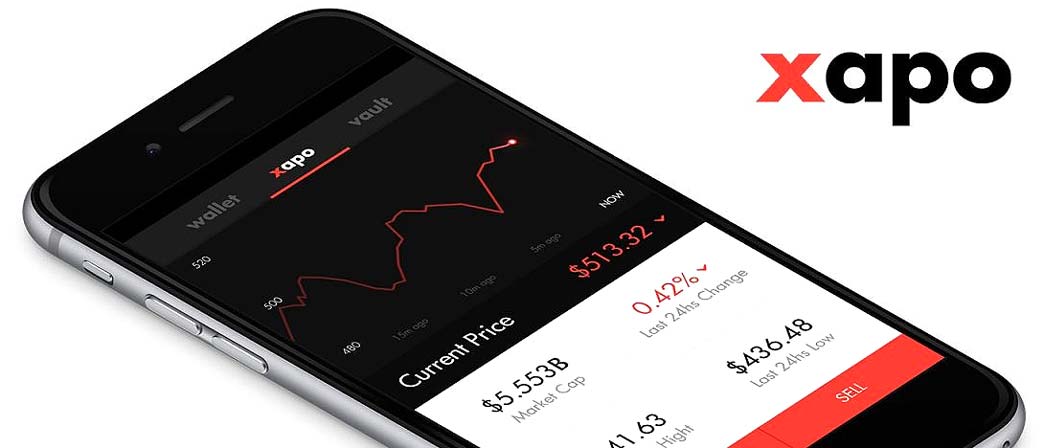
Xapo is a Bitcoin exchange. Aimed at new investors who have just entered this market, Xapo endeavors to explain to its users how the crypto world works. Newer crypto investors are able to leverage the educational materials and services offered by Xapo to smooth the transition from fiat currency to digital money.
Xapo offers users a wallet that stores cryptocurrency in a secure cryptocurrency vault. The wallet, in the form of an app, can be downloaded on any smartphone and allows users to manage funds from anywhere in the world. Xapo places an emphasis on facilitating ease of use and streamlining complex processes, making it ideal for individuals not yet ready to engage the services of a professional exchange.
While Xapo may be aimed at newcomers to the world of finance and cryptocurrency, the individuals behind the Xapo organization are some of the largest names in the financial landscape. Lawrence Summers, the former Secretary of the Treasury of the US under Bill Clinton, is associated with Xapo, as is Dee Hock — the founder of Visa. The presence of these individuals, as well as John Reed — the chairman and founder of Citibank — lends a significant amount of legitimacy to the platform.
During funding, Xapo captured a significant amount of capital — over $40 million USD — from companies like Benchmark Capital, Grelock Partners, Index Ventures, Fortress Investment, Ribbit Capital, Emergence Capital Partners, Pantera Capital, Digital Currency Group and AME Cloud Ventures.
How To Create A Xapo Account?
Xapo is a global service that focuses on assisting users with buying Bitcoin. Importantly, the Xapo platform allows users from anywhere in the world to purchase Bitcoin, which makes it popular with users in regions in which direct Bitcoin purchases are not available. Xapo verification is relatively simple — users must simply verify their identity before they are able to start trading. Photo ID can be used to verify identity, along with supporting documents and proof of residence.
Xapo accepted ID documents are generally driver’s licenses, passports, and government-issued IDs. As these change from country to country, some items are required.
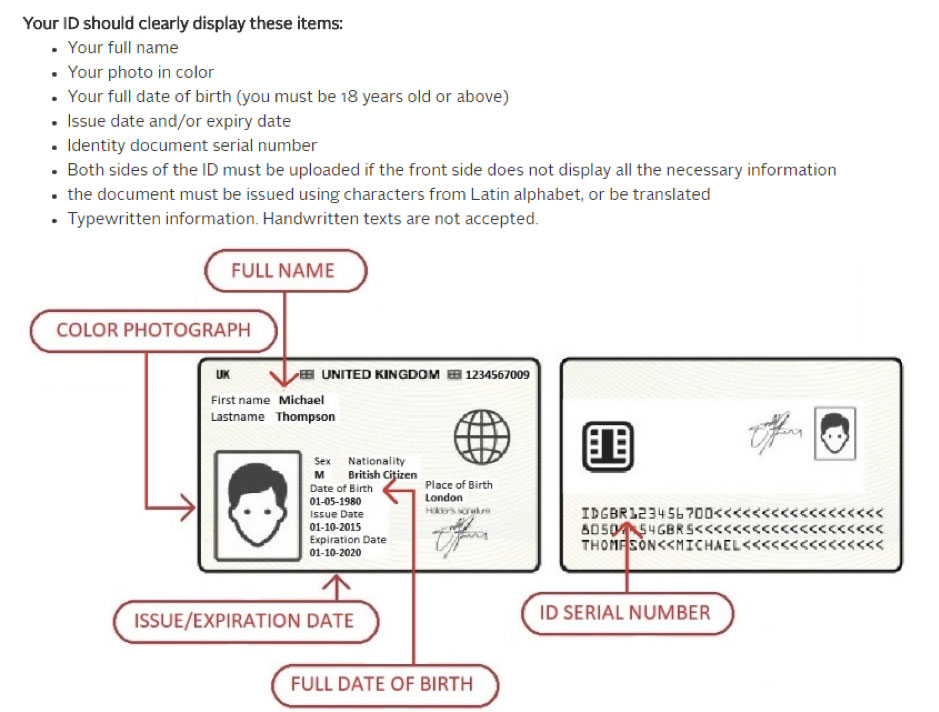
Xapo verification ID must state the full name of the user and must match the name used to create the account, a color photo, full date of birth, ID issue date, and a serial number. Both sides of the ID should be uploaded. If your documents do not use the Latin alphabet, you must translate them/ A valid proof of residence can any utility bill or government-issued ID that has your full name, address, date and is no more than 3 months old. It also needs to have the logo of the company or entity that issued it.
If you use the Xapo platform to purchase Bitcoin or withdraw it to another wallet or platform, you may be asked to verify your account with additional information to comply with legislation from different jurisdictions, as the company tries to comply with the rapidly evolving regulatory status of cryptocurrency in many different geographic regions.
How To Use Xapo?
After you have registered, you can use Xapo to buy, sell and send Bitcoin. Xapo users don't have to pay additional fees to send tokens to another Xapo wallets, but sending to external walelts incurs a miner fee (standard or high priority).
Deciding whether to use high priority or not may cost more. Xapo states that high priority transactions generally cost twice as much as standard, but are three times faster.
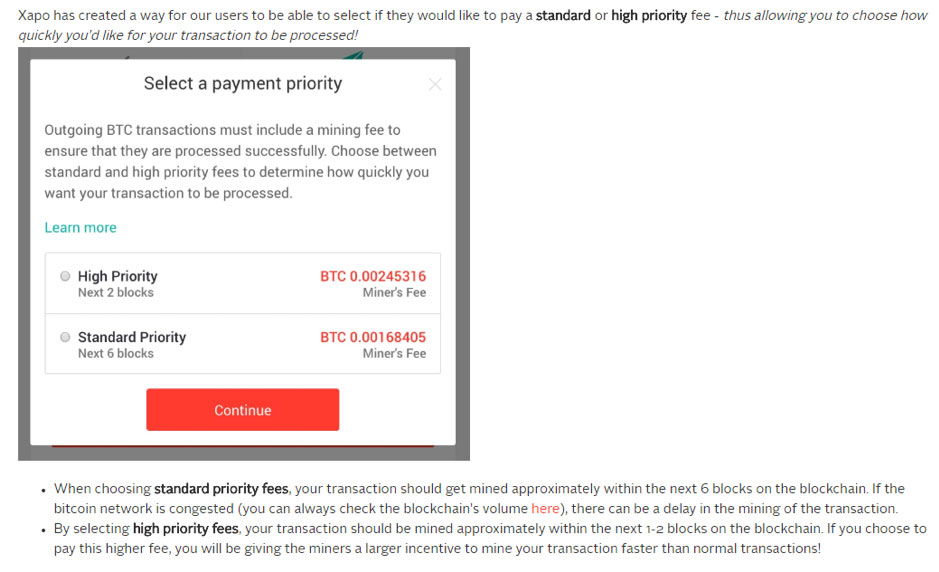
Buying Bitcoin from Xapo also incurs fees. Cryptocurrency purchases via Xapo are relatively competitive when compared to industry standards, however.
It's important to ensure that you follow the rules set out by Xapo in the terms of use carefully to ensure that you don't encounter any issues when attempting to withdraw your tokens. Breaking the Xapo terms of use is considered a serious offense by the platform, and could result in the loss of wallet access or tokens,
The Xapo Debit Card
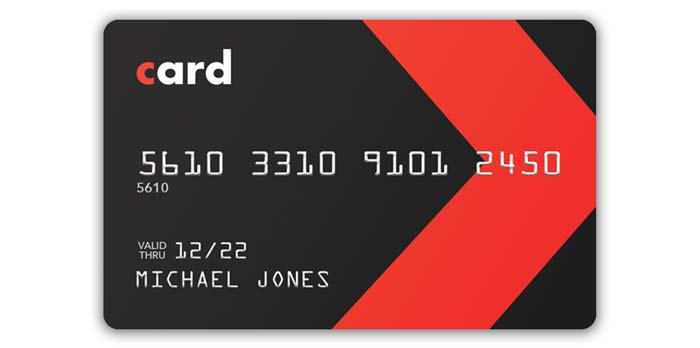
Xapo was one of the first companies to offer a cryptocurrency debit card that makes it possible to use Bitcoin anywhere in lieu of fiat currency Users of the Xapo debit card are able to use Bitcoin as a currency and directly purchase real-world goods with cryptocurrency. The exchange rate used to convert the Bitcoin when you purchase things with the card is based on the current value of the Bitcoin in the market at that moment plus fees.
Xapo For Institutions
Xapo is also an option for institutions and institutional investors. Setting up an institutional account with Xapo is somewhat more complex, but allows businesses that use Bitcoin to organize their coins and manage their assets in a more efficient manner.
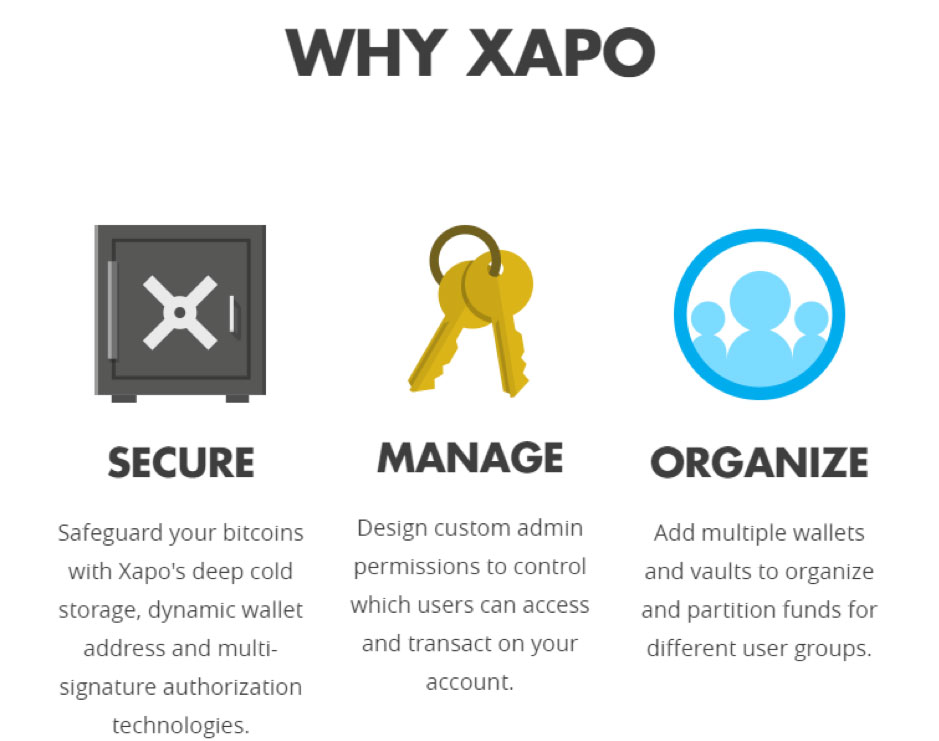
Xapo stores user cryptocurrency in cold storage, locked in a secret and secure vault. As such, Xapo is an attractive company for investors who possess large quantities of Bitcoin and do not feel secure holding them. Users are able to create multiple accounts to partition and store your funds well and let different users manage them.
Institutional accounts are also able to organize their team and give them Bitcoin to operate with, setting up permission levels and enabling some of them to access funds that others will not be able to.
Is It Safe To Use Xapo?
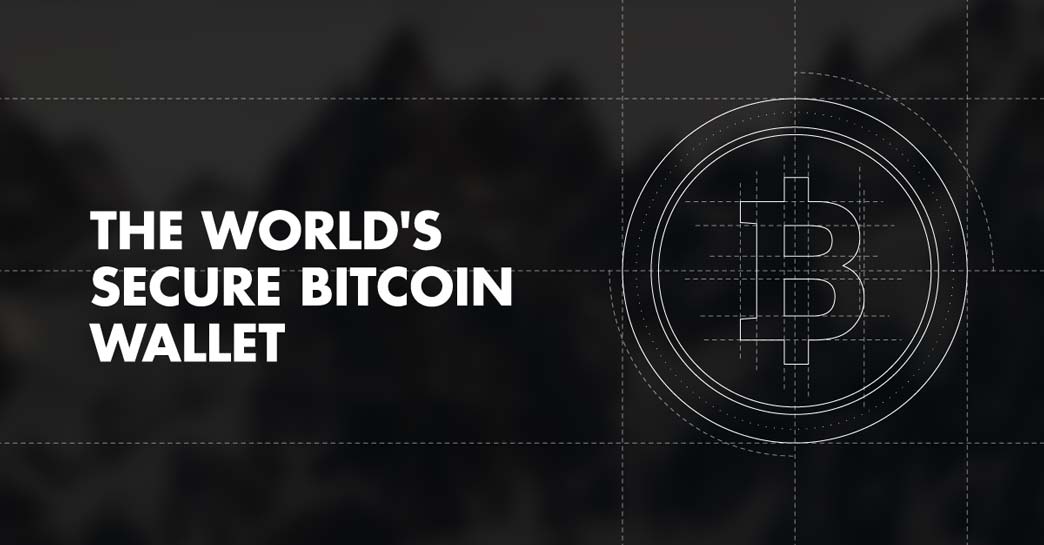
In short, yes. Xapo is a highly trustworthy platform as long as users verify identity information and follow terms and conditions. Is Xapo a scam? It's highly unlikely — the platform is backed by some of the largest names in the financial world, and provides legitimate service to millions of users.
Is Xapo safe? In addition to storing user cryptocurrency in a highly secure cold vault, the physical location of the Xapo datacenter is an undisclosed secure center in the Swiss Alps, preventing physical incursion. As such, Xapo is extremely safe.
The Xapo Verdict
If you are only interested in Bitcoin, Xapo is an excellent choice. Xapo is safe, reliable, easy to use, and backed by significant financial institutions. The only drawback of the Xapo platform is that it focuses exclusively on Bitcoin — investors interested in other tokens or altcoins will need to find another solution.
Overall, Xapo is a simple, safe option for individuals interested in getting started in the cryptocurrency market.
Cryptocurrency Information
Bitcoin Volumes Finally Grow Again and Bitfinex/Tether Issues Spark Systemic Risks, New Diar Report Affirms
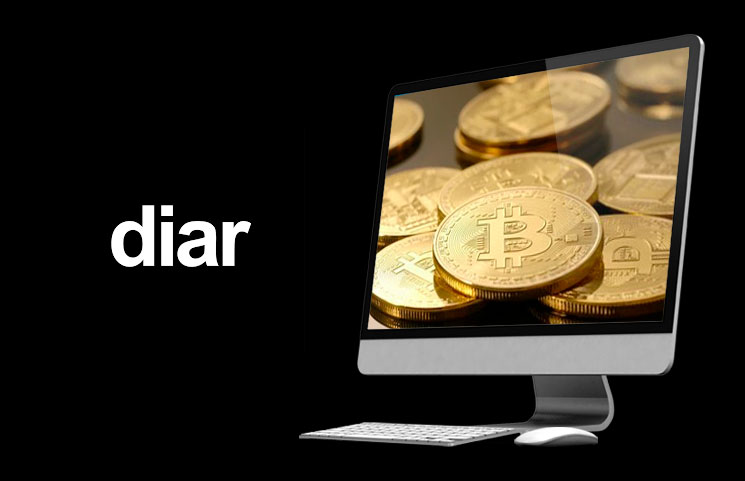
Diar has recently published its report of the crypto market for April. According to the company, Bitcoin volumes are finally growing again and the whole situation with Tether and Bitfinex showed the industry some of its systemic risks. DAI fee hikes and stablecoin projects were also highlighted in the report.
Bitcoin Goes Back To Growing Again
The main highlight of the month is, obviously, that Bitcoin is back on the action. After facing lows which started in 2018, the token has finally been able to effectively reverse the trends and have an actual price surge this month, going from less than $4,200 USD to over $5,200 USD during this short timeframe.
With this, the number of on-chain transactions has spiked for three months in a row, since prices started to get some of their value back in March and April. Now, transaction volumes are around their levels in June 2018 when the price of the asset was around $7,000 USD.
However, charts indicate that Bitcoin is yet to find more footing outside of speculative trading, so the bull market may not be as near as some think.
When looking at the volume of the whole quarters, Q1 2019 had lower volumes than Q4 2018, but Q2 2019 started considerably well.
Bitfinex and Tether Start Concerns of Systemic Risks
As you may have heard, Bitfinex was accused of using Tether funds to cover up its losses. According to Diar, there is a 26% shortfall of in-cash reserves to back Tether tokens (USDT). Tether loaned $850 million USD to Bitfinex to cover up losses and its general counsel Stuart Hoegner has affirmed that the company is operating with fewer reserves than the total market cap of the token.
This happened because Bitfinex had the $850 million USD “seized” by Crypto Capital, one of its payment processors. Unless Hoegner is lying, though, the company had the assets to back the stablecoin until recently.
While it is clear now that Tether simply does not have the money to back the funds, people simply keep buying the tokens. Now, instead of all cash, some shares of Bitfinex are being used to represent the rest of the value, which makes the stablecoin enter securities territory for the first time.
Curiously, the markets are all very tolerant now since the prices are still stable but the systemic risks are clear, especially if other companies are to follow Tether’s path.
DAI Hikes Fees Once More
Another situation highlighted by the reports is that DAI has decided to upgrade its stability fees once again as the community is desperately trying to make the prices of the so-called stablecoin go up again. DAI tokens are being sold for less than $1 USD, their official price, on secondary markets.
At the moment, the fees are 16.5%, after increasing three times in only one month. Before April, the fees were only 7.5%. This has resulted in a decrease of 4.9% in the circulation of DAI tokens.
Stablecoins Eye Wider Use Cases
Gemini and Harbor, a A16Z tokenized securities platform, have started a partnership in order to get more clients for the Harbor stablecoin. However, this was deemed “too soon” by Diar, as Harbor does not have any known token right now. The only one the company had was canceled.
TrustToken is also trying to get more stablecoins on its list, especially the ones that are not focused on USD, but on several other fiat currencies like HKD, CAD or GBP instead.
Cryptocurrency Information
#DropGold Campaign to Hit Your TV, Here’s A Breakdown of the Underlying Bitcoin Message(s)

Grayscale, a leader in digital currency investing, launched an ad on Wednesday, May 1, telling investors that money should be contributed to Bitcoin holdings as opposed to gold. In a number of interviews, CEO of Grayscale’s parent company (Digital Currency Group), Barry Silbert and Managing Director of Grayscale, Michael Sonnenshein, have since expressed the underlying message of the ad.
The #DropGold Ad
According to news outlet, U Today, the ad starts off with a man holding gold bars in his arm, which he decides to drop. While doing so, a woman also does the same. Throughout the ad, people supposedly have their gold bars stacked in shopping carts, while “losing their gold coins.” Watching what’s about to unfold, the two individuals try to find their way out.
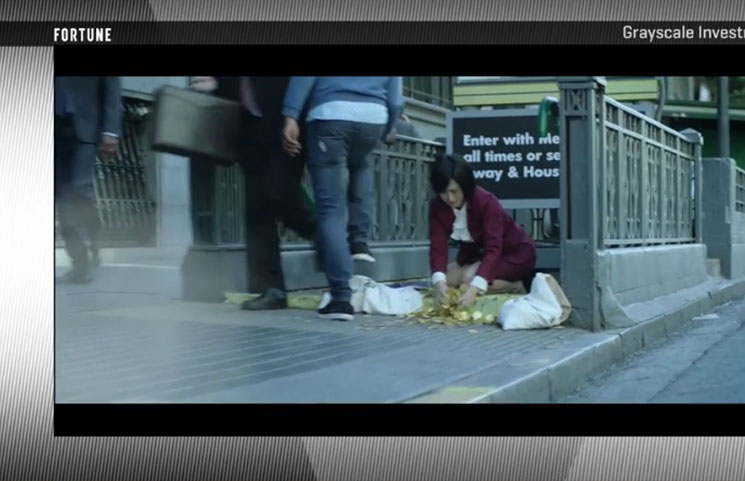
Advertising Bitcoin or Grayscale’s Services?
Despite being the one to have introduced this campaign, Silbert argues that it isn’t entirely about Grayscale services, but rather said services being a result of consumers’ decision. Yahoo Finance has since quoted the following comment made by Silbert himself:
“We do not see this as a Grayscale commercial. For us #DropGold is our ‘Got Milk’. This campaign is first and foremost focused on starting a conversation about bitcoin vs gold. If the ad makes people want to get into Bitcoin, we’re completely indifferent about how they go about doing it.”
Having said this, the commercial is evidently portraying Grayscale as an option, as towards the end, one is told, “Go Digital. Go Grayscale.”
Silbert’s and Sonnenshein’s Arguments Regarding Gold’s Limitations
Silbert believes that this campaign works towards addressing the fact that Bitcoin can serve as an equal asset class as gold, if not better. In particular, he was quoted saying, “But now you have Bitcoin, which, in our opinion, provides all the same attributes as gold – it’s fungible and scarce and you can’t counterfeit it – but the big difference is that Bitcoin has utility. Gold doesn’t have much utility beyond jewelry.”
He further argued that the goal here isn’t to replace fiat currency for shopping purposes, but rather to show the world that Bitcoin does a better job at doing gold’s job and this will be evident in the long run. Although he has acknowledged Bitcoin’s volatility as being concerning, he is hopeful that it will one day serve as both an ideal utility token and store of value.
As for Sonnenshein’s viewpoint, he sees this ad as revealing the “absurdity” associated with gold. More specifically, he said:
“We’re going after a narrative around gold being where investors should go when markets turn south or as a hedge against inflation […] we’re highlighting the absurdity of gold.”
As per The Block Crypto, Grayscale also tries to convince investors that the return earned from redistributing 5% of gold to Bitcoin will be greater than 5% yearly.
What are your overall thoughts on this ad? Did it leave you asking yourself, “Why did you invest in gold? Are you living in the past?” Share your thoughts below!
Cryptocurrency Information
Huobi Pro Bitcoin Exchange: Cryptocurrency Asset Trading Platform?

Huobi Pro Cryptocurrency Exchange
Founded in 2013, Huobi Pro allows for a myriad digital currencies to be exchanged, at a 0.2 percent trading commission. Loyal users point to the low fees and stellar service that make the exchange stand out above others.
Although pitched at dedicated cryptocurrency enthusiasts since the site doesn’t accept fiat currencies many who enter the realm on the back of fiat end up at Huobi Pro, largely due to its diverse offering and favorable fee structure.
Huobi Pro in A Nutshell

A victim of China’s clampdown on digital currencies, the company might be registered in the Seychelles, but was originally founded in Beijing. As testament to the broad appeal of the platform, after the Chinese regime effectively banned all things crypto at the beginning of 2018, trading volumes have only grown.
While at first very much a Chinese company looking at the home market, Huobi Pro has been forced to find a wider marketplace on the international scene. Indeed, even prior to the official cessation of altcoins and their trading, the company heard the rumblings in 2017 and took its cryptocurrency interests abroad.
Huobi now provides exchange services to users in over 130 countries. Company offices are located in the USA, Korea, Japan, Singapore and Hong Kong. Although the Huobi Group also owns and manages the Huobi Autonomous Digital Asset Exchange (HADAX), Huobi Pro is more of a pure “login and trade” exchange.
Users can employ network tokens to cast votes on adding new altcoins on HADAX. On the Huobi Pro exchange, a simplified offer encompassing all of the mainstream altcoins greets visitors. Some more popular coins offered are Bitcoin (BTC), Bitcoin Cash (BCH), Ethereum (ETH), Litecoin (LTC), NEM (XEM), NEO (NEO), Qtum (QTUM) and Ripple (XRP).
That said, when one actually tallies the number of altcoins available for exchange, it becomes apparent why loyal followers value the site. A marriage of both simple ease of use and diversity in trading, the platform is largely welcomed by newcomers and experienced enthusiasts alike. In the current melee of regulation being contemplated, implemented and tweaked all the while, some users may be precluded from trading on the exchange based on their country of residence.
Huobi Pro accepts the funding of accounts only in digital currencies, and accepts deposits in any of its listed altcoins. Unlike other exchanges that have opted for a midway between crypto and fiat, Huobi Pro traders deal strictly in digital coins at every point of a transaction. Funds need to be withdrawn to a wallet, and fiat users looking to buy in will have to establish a wallet first in order to fund their Huobi Pro trading account.
Traders pay a maker or taker fee of just 0.02 percent using the exchange. There are more detailed offers, worth looking at for daily traders with volume.
Huobi Pro Membership Levels

VIP users get preferential platform trading fees if they buy the privilege with Huobi tokens. The Huobi Token (HT) was never an ICO token, but rather a system token that users only obtain by buying “Point Cards” on the Huobi Pro platform. Point Card is essentially a pre-paid Huobi card that keeps users liquid on service fees. One HT = 1 USD, therefore one “point” = 1 USD. The more points purchased, the more free points are added, although savings on 1000 points, for example, means only 10 HT for free.
Huobi Global minted a fixed total of 500 million tokens, with 300 million employed to facilitate the in-house VIP structure. A mark of the business group behind the platform is seen in their practice of buying back-sold tokens from the open market each quarter. Not only that, but those funds go towards the Huobi Investor Protection Fund (HIPF).
This is a planned fund that will compensate investors who suffer platform disruption and subsequent losses. It’s a tool that minimizes risk, smooths out the market overall and also goes towards protecting investor interests. This transparent and pleasing aspect of the platform is one reason traders have confidence in the exchange, and its popularity is rising worldwide.
By way of example, in order to glean a VIP status, a trader will pay 120 HT a month for First Level membership. This enables a 20 percent discount on trading fees. Running through toward the top end, a pricier option of 6,000 HT a month secures a 50 percent discount on fees. Overall, a diligent trader can optimize the system and come out with a substantial discount on the already low 0.02 percent base offer.
The company charges no fees to deposit funds, but there are withdrawal fees. Although there are reviews online listing withdrawal fees, it appears that, especially within the membership structure, users are advised to ascertain exact fees when establishing their account. Likewise, transfer limits need to established upfront to avoid disappointment later. There exist order size limits on the platform too, again becoming more malleable as one moves up the ranks of the VIPs.
Security And UX On Huobi Pro

All of the standard protocols including two-step Google Authenticator verification are at play on the platform. Unlike many other exchanges that offer a simple crypto-exclusive platform, Huobi Pro will need your personal details in the form of a passport copy and chat room comments are not devoid of complaints, although almost all of them take issue with the structure of the platform and its potential pitfalls. There are few allegations of lost funds or other negligence on behalf of the company. On the whole, Huobi Pro seems to be rubbing off its decidedly corporate ethos onto the exchange – good news for traders overall.
Another serious boon for the cryptosphere as a whole is that over 98 percent of holdings are stored in an offline cold wallet or vault. Imbued with a strict customer service ethic, the platform probably sports the best customer service to date for crypto exchanges. Available 24/7 365, there is a live chat option onsite.
The platform intel is sufficient although newbies might have to scratch to paint a clear picture of how exactly everything works. The FAQs are thoughtful and, again, testament to a polished offering. Huobi used to be one of the biggest Chinese crypto exchanges, based in Beijing. Started by entrepreneur Leon Li in 2013, since the move there has been mutual appreciation of its value. Worldwide users have taken to the exchange, as it too realized that it had global appeal.
Huobi Pro Conclusion

Huobi claims to have exceeded BTC 500,000 in daily trading approaching 2014. Although only in its fifth year, that’s a long time in cryptocurrency. Although frequently accused of embellishing trading volumes, these allegations have never been proven. In comparison to other digital exchanges that have suffered persistent user complaints and even been shut down due to criminal activity, Huobi Pro shines.
As an offering, it has low fees, great diversity and an unbeatable crypto-energy. No trader on the platform feels like they’re missing out on something else somewhere else, by most accounts. Possibly due to their prior involvement in the fintech world, the platform got it right first time around and user numbers prove it. The company Huobi also owns another trading platform, BitYes, more focused on USD/BTC and USD/LTC pairs trading. Great customer service and minimal technical glitches have made it appear positively top-tier, again in comparison to less polished outfits.
With a detailed offering, great client liaison – very unusual for most digital exchanges so far – and no legitimate proof of anything even vaguely dark hanging about them, the Huobi Pro project is recommended. Users are advised to always ascertain costs prior to trading – not hard with the customer support in this case – and sample a platform with small trades before trading greater amounts. To learn more, you can head to their official website: huobi.pro










